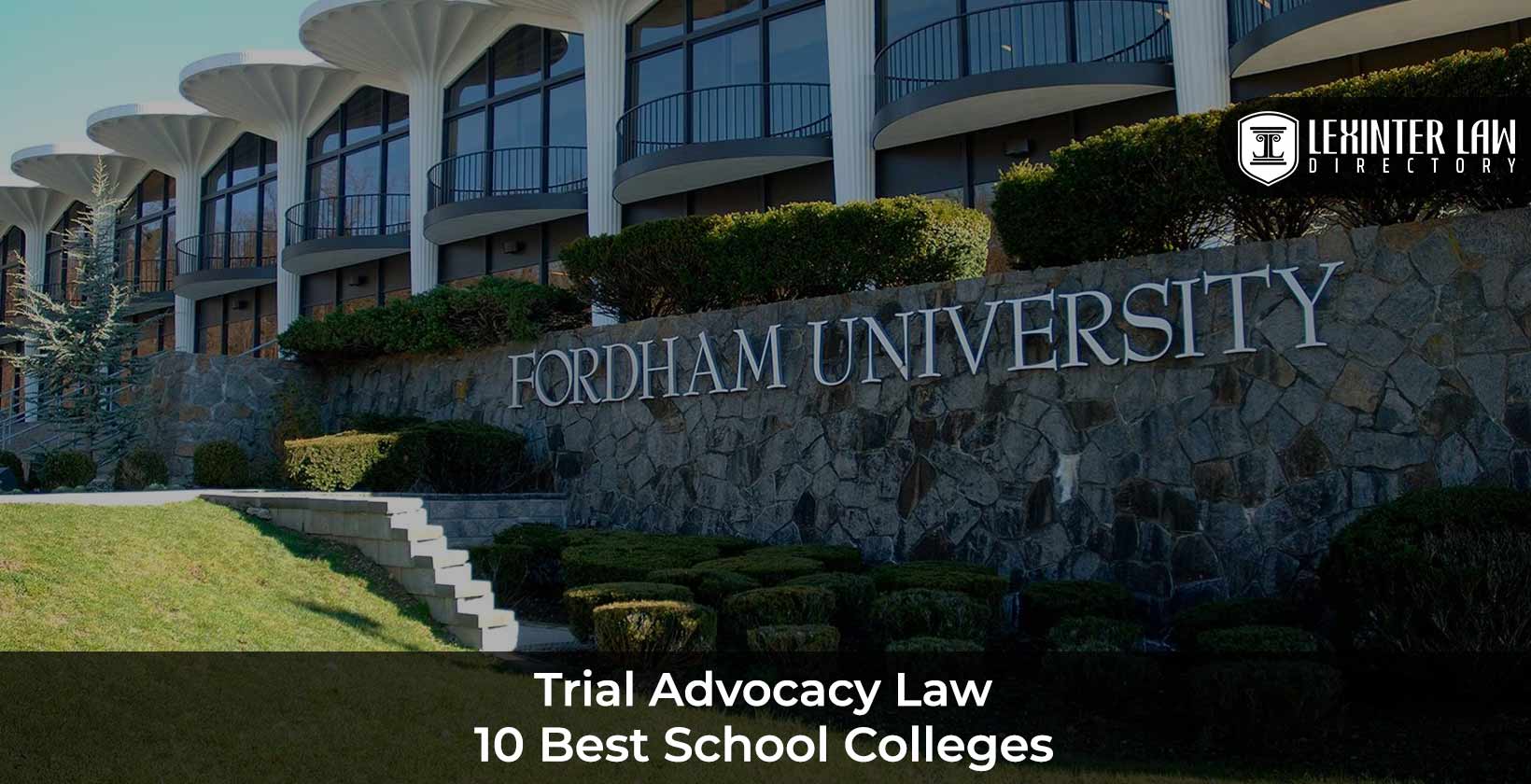10 Best Trial Advocacy Law School Colleges
Trial advocacy law is a specialized area that requires a distinct set of skills, blending legal knowledge with persuasive communication. Choosing the right law school college with a robust trial advocacy program is crucial. The ten law schools that stand out as the best in the nation for trial advocacy law are widely recognized for their rigorous programs and outstanding reputations. The institutions are known for producing highly skilled trial attorneys who excel in courtroom settings. Temple University (Beasley) is recognized as a leader in the field, offering a comprehensive trial advocacy program emphasizing theory and practice. Stetson University offers an environment where courtroom strategy is honed through intensive practice. Fordham University offers a well-rounded approach to trial advocacy law, integrating classroom instruction with hands-on experience. Top law school colleges, including Loyola Marymount University and Drexel University (Kline), offer environments where students sharpen their advocacy skills. The trial advocacy program at each institution is crafted to ensure that graduates understand the law and apply it effectively in court.
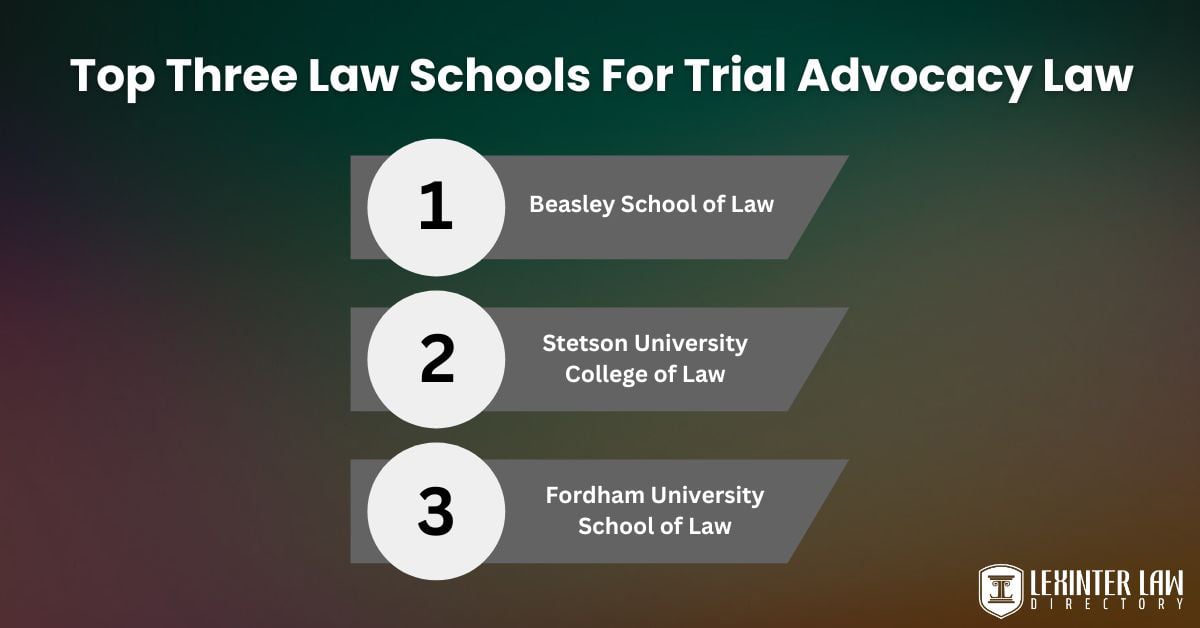
The top three law schools for trial advocacy law are listed below.
- Beasley School of Law: Temple University’s James E. Beasley School of Law excels in trial advocacy, offering rigorous training and advanced courses. The school, founded in 1895, is located in Philadelphia, Pennsylvania, providing a rich urban environment for legal studies. The Juris Doctor program, available in full-time and part-time formats, emphasizes practical courtroom skills. Temple Beasley ranks #1 in Trial Advocacy and boasts a 95.2% employment rate for 2023 graduates. Tuition costs $30,880 for residents and $46,776 for non-residents.
- Stetson University College of Law: Stetson University College of Law, established in 1900 in Gulfport, Florida, ranks #1 in trial advocacy law. The law school offers diverse programs, including J.D., LL.M., and dual degrees like J.D./M.B.A., with full-time and part-time options. Stetson provides hands-on training through clinics, mock trials, and advanced courses. Tuition for 2024-2025 is $52,748, with total costs estimated at $79,166. The school ranks highly in Legal Writing and boasts strong employment outcomes, with 82.5% securing full-time legal positions.
- Fordham University School of Law: Fordham University School of Law, established in 1905, excels in trial advocacy law, ranking #4 nationally. The school offers diverse programs, including J.D., nine LL.M. specializations, and dual degrees like J.D./M.B.A. Fordham Law’s 2023-2024 tuition is $72,282, with total costs reaching $105,492. The Brendan Moore Trial Advocacy Center provides intensive training, benefiting from top-notch faculty and extensive clinical opportunities. Graduates enjoy strong employment outcomes, with 88.1% securing long-term legal positions.
Table of Contents
- 1. Beasley School of Law
- 2. Stetson University College Of Law
- 3. Fordham University School Of Law
- 4. Baylor University School Of Law
- 5. Cumberland School Of Law
- 6. UCLA School Of Law
- 7. Drexel University Thomas R. Kline School Of Law
- 8. South Texas College Of Law Houston
- 9. Loyola Law School
- 10. Mercer University School Of Law
- How To Choose The Best Law School For Trial Advocacy?
- Which Degree Is Best For Trial Advocacy Lawyer?
- How To Become A Trial Advocacy Lawyer?
- How Long Would It Take To Study Trial Advocacy?
- What Is The Average LSAT For Trial Advocacy?
- What Can You Expect From A Career As A Trial Advocacy Lawyer?
- What Is The Difference Between Trial Advocacy Lawyers And Human Rights Lawyers?
- How Do Trial Advocacy Lawyers Earn?
- Where Do Trial Advocacy Lawyers Work?
- How To Find Good Trial Advocacy Lawyers Near Me With Lexinter?
1. Beasley School of Law
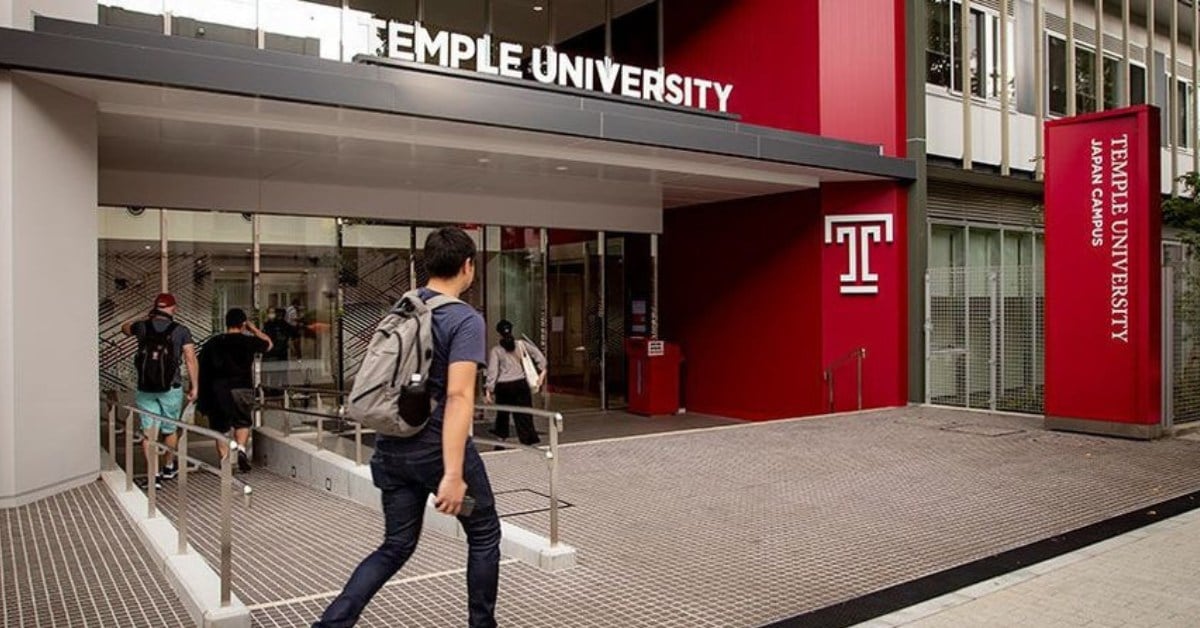
Temple University’s James E. Beasley School of Law stands out as one of the premier institutions for trial advocacy law. Students receive exceptional training in courtroom procedures and litigation. The law school, established in 1895, is situated in Philadelphia, Pennsylvania, providing a rich urban environment for legal studies. Temple University’s James E. Beasley School of Law accommodates diverse legal education needs with various programs. The Juris Doctor (J.D.) program, available in full-time and part-time formats, offers a rigorous curriculum emphasizing theoretical and practical aspects of law. The LL.M. program, catering to U.S. and international lawyers, allows customization from over 180 courses, with opportunities to study in Tokyo, Beijing, or Rome. Specialized certificates in Estate Planning and Employee Benefits are available through the Graduate Tax Program.
Temple University’s James E. Beasley School of Law has an acceptance rate of 39.4% for the academic year 2023-2024. Tuition fees at Temple University’s Beasley School of Law for the 2024-2025 academic year are $30,880 for Pennsylvania residents and $46,776 for out-of-state students. The total cost of attendance, including living expenses, is $55,828 for Pennsylvania residents and $71,724 for out-of-state students. Temple University’s Beasley School of Law ranks #54 in Best Law Schools and #4 in Part-time Law. The law school ranks #1 in Trial Advocacy, #15 in Health Care Law, #16 in International Law, and #30 in Intellectual Property Law. Temple University’s Beasley School of Law is renowned for producing skilled advocates and legal professionals. The robust curriculum attracts top-tier students and faculty, bolstering the institution’s reputation as a leader in legal education.
Temple University’s Beasley School of Law offers exceptional specialized programs in trial advocacy law. Students participate in rigorous mock trials and competitions. Advanced trial advocacy courses include complex litigation and courtroom technology training. The trial advocacy program features an intensive summer boot camp. The focus on practical skills prepares students for real-world courtroom challenges. Temple University Beasley School of Law boasts notable faculty in trial advocacy law. Jules Epstein, the Edward D. Ohlbaum Professor of Law, directs Advocacy Programs and specializes in criminal law and evidence. Elizabeth Lippy, Director of the trial advocacy program, excels in courtroom technology and remote advocacy. Marian Grace Braccia, Director of the LL.M. in trial advocacy program, has significant litigation experience. Ken Jacobsen, Practice Professor of Law, brings expertise in civil procedure and sports law. The distinguished professors enhance the school’s reputation in trial advocacy education.
Temple University Beasley School of Law offers robust clinical opportunities in trial advocacy. The Integrated Trial Advocacy Program (ITAP) integrates doctrinal and practical learning through criminal and civil trial simulations. Advanced Trial Advocacy (ATA) classes refine courtroom skills with real-world experts, focusing on trial components. External clinics and externships near state and federal courts provide students with practical experience under experienced mentors. The Access to Justice Clinic offers hands-on experience addressing systemic legal issues and collaborating with community leaders.
Temple University Beasley School of Law offers a comprehensive trial advocacy law curriculum featuring advanced courses and electives. Students take Advanced Trial Advocacy, focusing on refining courtroom techniques through real-world simulations. The Evidence course delves into rules and applications in trial settings. Complex Litigation addresses multifaceted legal issues in civil and criminal trials. Specialized courses in courtroom technology and remote advocacy provide training for modern trial environments. Pre-trial litigation prepares students for stages before trial, including discovery and motions. The courses, combined with experiential learning opportunities, equip students with essential skills for successful trial advocacy. Temple University’s Beasley School of Law achieved a 95.2% overall employment rate for the Class of 2023, with 93.3% securing full-time, long-term positions. Graduates found diverse employment opportunities, with 51% in law firms, 14.8% in government roles, and 11% in public interest positions.
2. Stetson University College Of Law
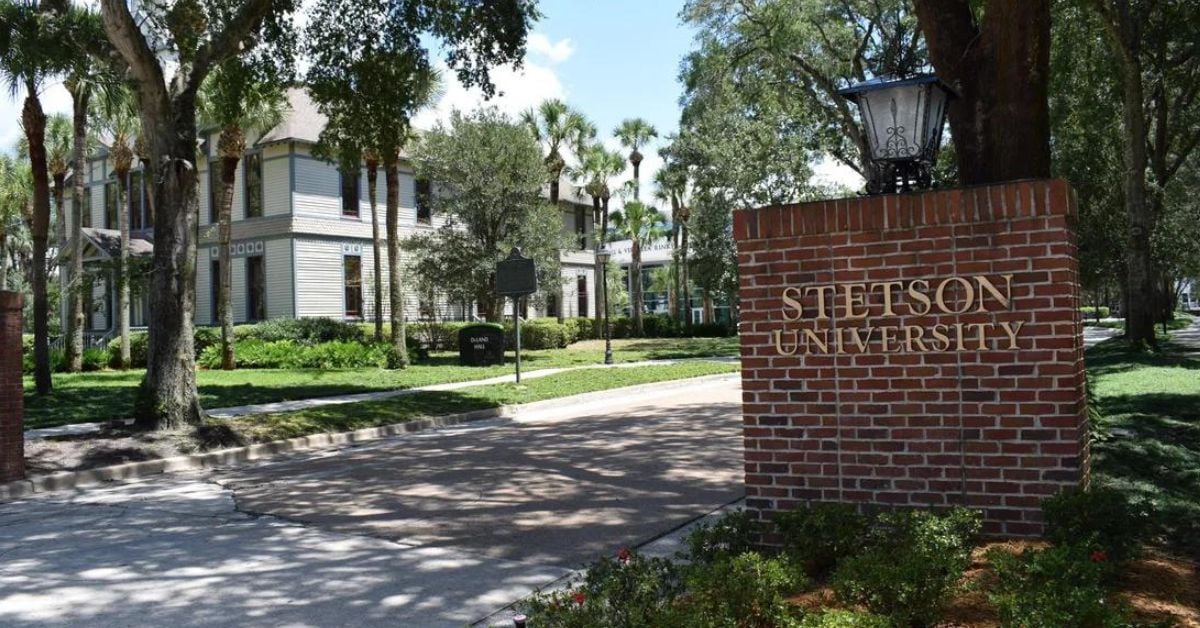
Stetson University College of Law is renowned as one of the best law schools for trial advocacy law, holding the #1 ranking in the specialty. The distinction highlights the school’s commitment to excellence in legal education and practical training. The law school, established in 1900, is in Gulfport, Florida, providing a picturesque and conducive environment for studying law. Stetson University College of Law provides diverse law degree programs catering to various academic and professional interests. The Juris Doctor (J.D.) program, essential for practicing law in Florida and many other jurisdictions, is available in full-time and part-time formats. Master of Laws (LL.M.) programs include Advocacy, Elder Law, and International Law, offering advanced legal training. The Master of Jurisprudence (M.J.) in Healthcare Compliance equips professionals to manage regulatory issues. Dual degree programs, including J.D./LL.M. in Advocacy and J.D./M.B.A., allow students to earn two degrees in a reduced time frame. Special opportunities include the Accelerated 3+3 Bachelor’s/J.D. program and international study programs, clinics, and externships, providing practical legal experience.
Stetson University College of Law has an acceptance rate of 38.39% for the academic year 2023-2024. The tuition for Stetson University College of Law’s 2024-2025 full-time J.D. and LL.M. programs is $52,748, with total costs estimated at $79,166. The part-time J.D. tuition is $36,232. Stetson University College of Law ranks #98 in Best Law Schools (tie) and #30 in Part-time Law. The law school ranks #1 in Trial Advocacy (tie), #3 in Legal Writing (tie), #51 in Dispute Resolution (tie), and #81 in Environmental Law (tie). The law school has a strong reputation for excellence in trial advocacy and legal writing. Stetson’s faculty and comprehensive curriculum contribute to its standing as a top institution for aspiring lawyers. Florida best law schools, like Stetson, provide an exceptional foundation for a successful legal career.
Stetson University College of Law offers specialized programs in trial advocacy law. The programs focus on hands-on courtroom experience and practical training. Students participate in mock trials, competitions, and workshops. Advanced trial advocacy courses help develop critical litigation skills. The programs emphasize civil and criminal trial techniques. Students benefit from state-of-the-art courtroom facilities. Real-world practice opportunities are abundant through various legal clinics. Stetson’s trial advocacy program consistently ranks among the top in the nation. Notable faculty in trial advocacy law at Stetson University College of Law contribute significantly to the program’s top ranking. Elizabeth Ippolito Boals, Director of the Center for Excellence in Advocacy, teaches Evidence and Criminal Law. Michael “Jay” VanDerZee, Director of Trial Teams, brings extensive experience from the U.S. Air Force JAG Corps. Kelly M. Feeley, a Professor of Law, has led Stetson’s arbitration teams to multiple national championships. Stetson’s faculty expertise enhances students’ practical advocacy skills.
Stetson University College of Law offers extensive clinical opportunities in trial advocacy law. The Prosecution Clinic allows students to handle real cases and participate in trials. The Public Defender Clinic provides experience in criminal defense by working with public defenders. The Advanced Veterans Advocacy Clinic assists veterans with legal issues like disability benefits. The Civil Legal Services Clinic covers family law, housing, and consumer protection. The Child Advocacy Clinic focuses on child welfare law. The Immigration Law Clinic handles asylum and deportation cases. The clinics provide invaluable hands-on legal experience.
Stetson University College of Law provides numerous networking opportunities and has notable alumni in trial advocacy law. The Alumni Mentoring Program connects first-year students with experienced graduates, offering valuable guidance. Advocacy Competitions present chances to meet judges and practicing lawyers. Externships and Clinics place students in various legal settings, fostering professional relationships. Advocacy Conferences and Workshops offer platforms to learn from experts. David Barrera, Jeff Chang, and Jounice Brown are among the notable alumni who have excelled in their legal careers in trial advocacy law.
Stetson University College of Law offers a comprehensive trial advocacy law curriculum with advanced and elective courses designed to enhance students’ litigation skills. Advanced Trial Advocacy focuses on mastering courtroom techniques and evidence handling. Pretrial Practice and Procedure emphasizes drafting pleadings, motions, and discovery documents. Complex Litigation delves into managing multifaceted cases. The Evidence Workshop provides hands-on experience with real-world evidence challenges. Elective courses, including Deposition Strategies and Techniques, teach effective witness examination. Each course equips students with essential skills for successful trial advocacy. Stetson University College of Law boasts strong employment outcomes for its graduates. The Class of 2023 saw 82.5% securing long-term, full-time legal positions and 93.7% obtaining any long-term job.
3. Fordham University School Of Law
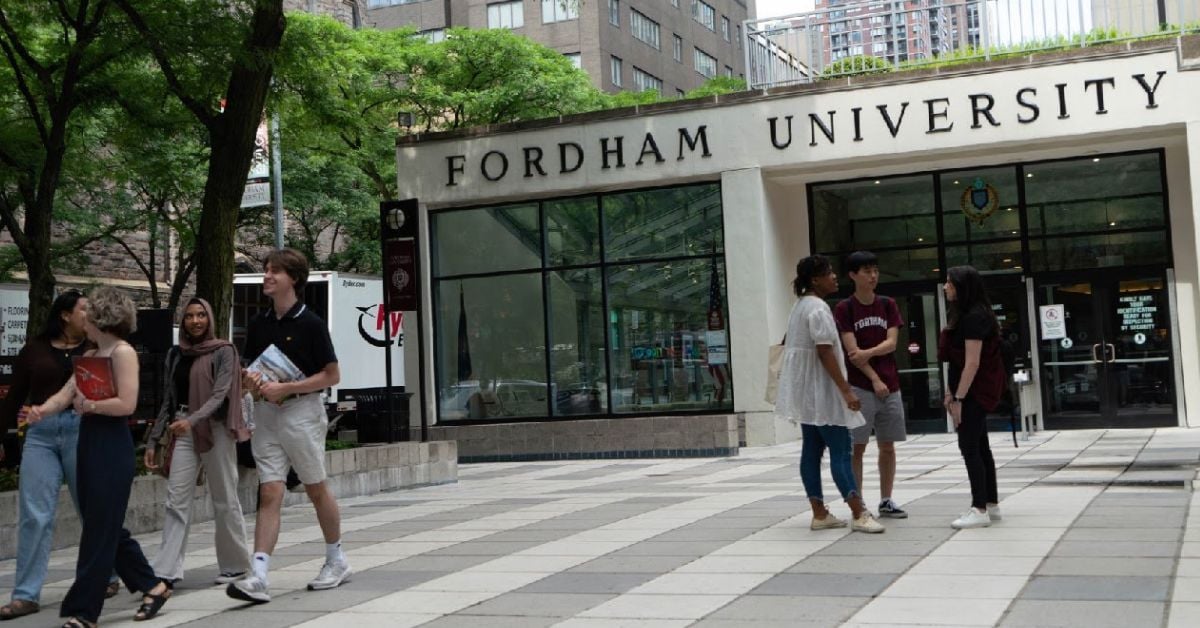
Fordham University School of Law is renowned for its exceptional trial advocacy law program, which is consistently ranked among the nation’s best. The prestigious institution provides comprehensive legal education, preparing students to excel in various legal fields. Fordham Law, established in 1905, offers a rich history and a commitment to academic excellence. Fordham University School of Law offers diverse law degrees, catering to various legal career paths. The Juris Doctor program, ideal for U.S. legal practice, includes specializations and experiential learning in New York City. The school provides nine LL.M. specializations, available online and in-person, and a one-year M.S.L. program for non-lawyers seeking foundational legal knowledge. The advanced S.J.D. degree focuses on scholarly legal research, while dual degrees like the J.D./M.B.A. broaden career opportunities.
Fordham University School of Law’s acceptance rate for the academic year 2023-2024 is 21.13%. Fordham University School of Law’s tuition and fees for the 2023-2024 academic year are $72,282, marking an 8.29% increase. The total cost of attendance, including average living expenses of $33,210, reaches approximately $105,492. Fordham University School of Law ranks #33 in Best Law Schools and #2 in Part-time Law. The school ranks #4 in Trial Advocacy, #8 in Intellectual Property Law, and #17 in Business/Corporate Law. The law school ranks #15 in Criminal Law. Fordham University School of Law holds a strong reputation for producing skilled legal professionals. The school benefits from a prime location in New York City, and graduates excel in various legal fields, enhancing the school’s prestige.
Fordham University School of Law offers specialized programs in trial advocacy law. Students engage in the trial advocacy program, which focuses on developing courtroom skills. The Brendan Moore Trial Advocacy Center provides intensive training through mock trials and competitions. Unique features include access to advanced simulation technology and expert mentoring. The school hosts the prestigious Fordham Law Trial Competition, attracting top advocacy teams. Students benefit from partnerships with New York City’s legal community, enhancing practical experience and networking opportunities.
Fordham University School of Law boasts notable faculty in trial advocacy law. Adam Shlahet, Director of the Brendan Moore Trial Advocacy Center, is renowned for his contributions to trial advocacy education. James Kainen, holding the Brendan Moore Chair in Advocacy, significantly mentors students. Faculty members bring extensive practical experience to their teaching, including roles as public defenders and special assistant attorneys general. The real-world insights and academic rigor create an exceptional learning environment for aspiring trial lawyers.
Fordham University School of Law provides extensive clinical opportunities in trial advocacy. The Brendan Moore Trial Advocacy Center offers hands-on experience through workshops and competitions judged by legal professionals. Clinical programs, including the Criminal Defense Clinic and Federal Litigation Clinic, allow students to work on actual cases and appear in court. Trial advocacy competitions like the American Association of Justice National Trial Competition enhance student skills. The opportunities ensure comprehensive understanding and proficiency in trial procedures and advocacy.
Fordham University School of Law excels in networking opportunities and boasts notable alumni in trial advocacy. The Brendan Moore Trial Advocacy Center connects students with peers, faculty, and alumni through events and competitions. Alumni involvement, including coaching and mentoring, provides valuable insights and networking opportunities. Fordham Law’s numerous affinity groups and alumni chapters foster strong professional networks. Notable alumni, including Adam Shlahet and Tiffany Ahn, exemplify the school’s commitment to trial advocacy excellence. The connections support students’ career success.
Fordham University School of Law offers advanced courses and electives in trial advocacy law. The curriculum includes Advanced Trial Practice, focusing on sophisticated trial techniques and strategies. Evidence courses cover the intricacies of presenting and challenging evidence in court. The Litigation Skills course emphasizes practical skills, including depositions and pre-trial motions. Students enroll in specialized seminars addressing contemporary issues in trial advocacy. Intensive workshops provide hands-on training in trial components like opening statements and cross-examinations. The courses equip students with the advanced knowledge and practical skills necessary for successful trial advocacy careers. Fordham University School of Law boasts high employment rates, with 88.1% of the class of 2023 securing long-term, full-time legal positions. 93.9% of graduates obtained full-time jobs, reflecting the school’s strong career preparation.
4. Baylor University School Of Law
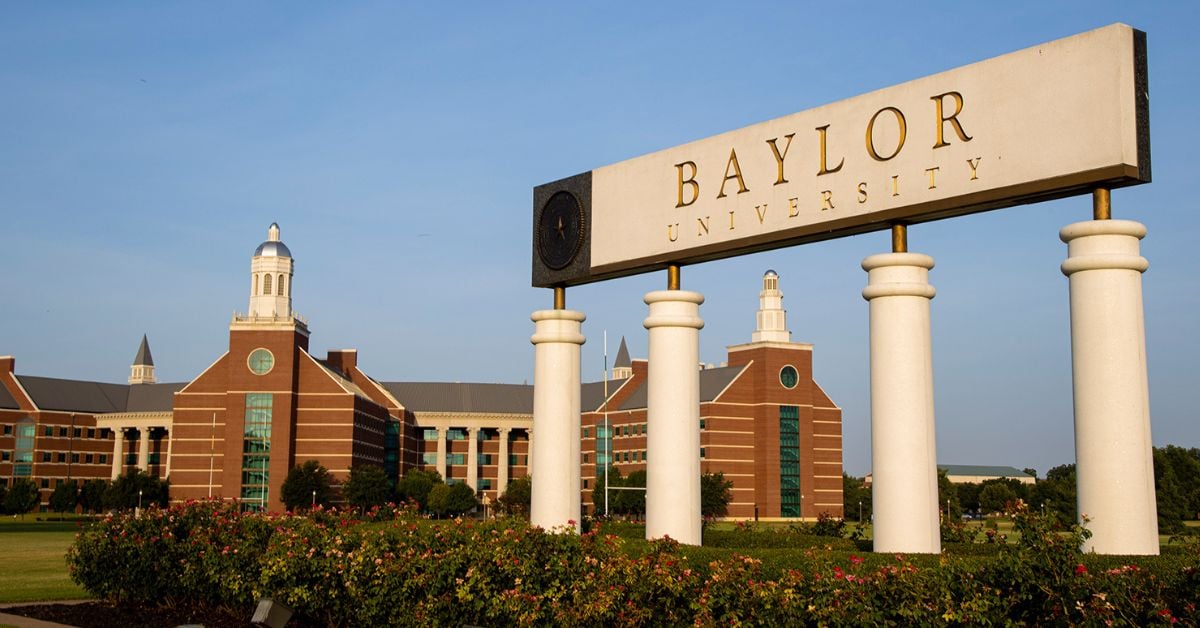
Baylor University’s School of Law excels in trial advocacy law and ranks among the best in the field. The school, established in 1857, resides in Waco, Texas. Baylor Law provides a rigorous curriculum that prepares students for legal practice. Baylor University’s School of Law offers a rigorous Juris Doctor (JD) program. Students must complete 126 quarter hours of credit with a minimum GPA of 2.0 in core courses. The law students need to attend 21 seminar hours in professional development. Dual degree options include JD/Master of Divinity, JD/Master of Public Policy and Administration, and JD/Master of Taxation. Practical training through Trial Advocacy and Transactional Programs ensures graduates are well-prepared for legal careers.
Baylor Law School has an acceptance rate of 17.77% for the academic year 2023-2024. Baylor Law School’s tuition and fees for the 2024-2025 academic year are $64,650, reflecting a 4.48% increase from the previous year. The total estimated cost of attendance, including additional expenses, is approximately $86,856. Baylor Law School ranks #46 in Best Law Schools. Law school specialty rankings include #3 in Trial Advocacy, #64 in Business/Corporate Law, #92 in Tax Law, and #51 in Legal Writing. Baylor Law School’s trial advocacy program features intensive training in courtroom procedures. Students participate in mock trials to hone their litigation skills effectively. The program includes real-world simulations, providing practical experience unmatched by other schools. Advanced advocacy courses focus on specialized areas like criminal and civil litigation. The emphasis on hands-on training sets the program apart from many others. Baylor’s advocacy teams consistently win national and regional competitions. The school’s advocacy training is renowned for producing skilled, confident litigators.
Baylor Law School’s trial advocacy program features notable faculty who significantly contribute to its excellence. Jerry Powell, named Baylor Lawyer of the Year, has greatly impacted the program’s high standards. Kathryn Snapka, an accomplished trial lawyer and Jaworski Fellow, provides personalized feedback during the Practice Court Program. Stephen Rispoli, Associate Program Coordinator, manages the prestigious Academy of the Advocate at St. Andrews. The distinguished faculty members enhance the program’s reputation and ensure students receive exceptional training.
Baylor Law School offers robust clinical opportunities in trial advocacy through its Trial Advocacy Clinic. The Juvenile Court Clinic focuses on representing juveniles at detention hearings. Students gather case information and present arguments in court, enhancing their client counseling skills. The Municipal Court Clinic represents defendants facing Class C misdemeanors. Students handle all aspects of misdemeanor cases, gaining practical courtroom advocacy experience. The clinical opportunities provide real-world litigation experience, preparing students for the realities of legal practice.
Baylor Law School provides numerous networking opportunities through the Baylor Lawyer Network on LinkedIn. The private groups facilitate connections among alumni across various regions. The Baylor Law Alumni Association organizes events, including receptions and luncheons, to foster strong professional networks. Alumni Spotlight and Awards recognize outstanding achievements, helping students and alumni connect with notable professionals. Notable alumni in trial advocacy law include Rekha Roarty, a Texas Superlawyer Rising Star, and Judge Amos L. Mazzant, III, the 2024 Baylor Lawyer of the Year. The alumni exemplify the high caliber of Baylor Law graduates.
Baylor Law School offers a comprehensive trial advocacy curriculum with advanced and elective courses. Students take Advanced Trial Preparation and Practice, focusing on pre-trial procedures and case strategy. Complex Litigation addresses multi-party and multi-jurisdictional cases, enhancing litigation skills. Evidence and Discovery Practicum provides hands-on experience in managing discovery and evidentiary issues. The Expert Witness Workshop trains students in handling expert testimony in court. Alternative Dispute Resolution covers negotiation, mediation, and arbitration techniques. The courses equip students with practical skills and in-depth knowledge, preparing them for successful careers in trial advocacy. Baylor Law School’s Class of 2023 achieved a 97.8% overall employment rate, with 94.9% securing long-term, full-time legal jobs. 95.0% of graduates were employed in positions requiring Bar passage.
5. Cumberland School Of Law
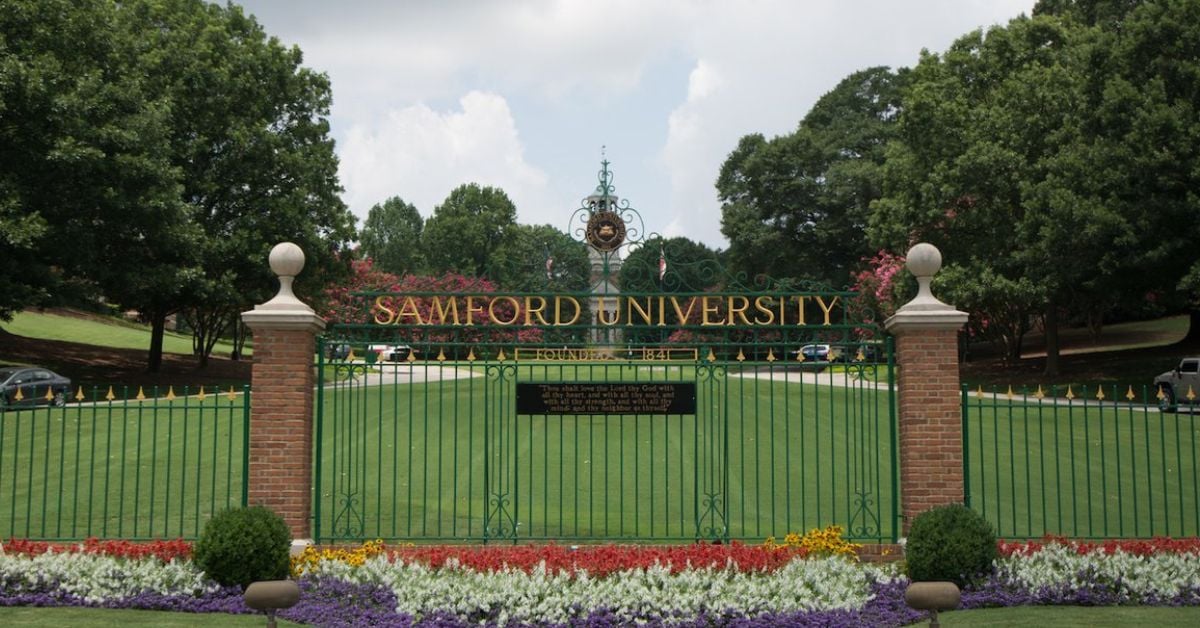
Samford University’s Cumberland School of Law is renowned for its excellence in Trial Advocacy Law, consistently ranking among the best law schools in the field. Cumberland School of Law, established in 1847, is one of the oldest law schools in the United States. Samford University’s Cumberland School of Law offers diverse legal education programs. The JD program equips students with practical skills and ethical knowledge. Students choose from electives, joint degrees, and experiential learning in clinics, externships, and public interest programs. The 31-hour online LLM degree allows JD holders to specialize in financial services and health law. The 34-hour online MSL degree provides non-lawyers with legal knowledge for careers in compliance, ranking highly for online legal studies.
The acceptance rate for Samford University’s Cumberland School of Law for the 2023-2024 academic year is approximately 55.67%. Tuition and fees for the 2023-2024 academic year at Cumberland School of Law are $45,236, reflecting a 2.07% increase from the previous year. The total attendance cost is approximately $73,770. Cumberland School of Law is ranked #103 in Best Law Schools. The school ranks #6 in Trial Advocacy, #102 in Tax Law, #116 in Constitutional Law, and #132 in Health Care Law. The law school is renowned for its strong advocacy training, practical legal education, and commitment to ethical practice. Graduates have a high employment rate, and the school offers diverse programs to ensure comprehensive legal training.
Samford University’s Cumberland School of Law offers specialized programs in trial advocacy law. The National Trial Team competes in prestigious national competitions. Students gain hands-on experience through the Advocacy Program’s mock trials. The Public Interest Law Program emphasizes advocacy for underserved communities. Intensive workshops and practicums develop courtroom skills and legal strategies. The programs distinguish Cumberland from other law schools by providing comprehensive advocacy training.
Notable faculty in trial advocacy law at Cumberland School of Law are highly esteemed in the field. Sara Williams, a nationally recognized trial lawyer, serves as the Visiting Director of Advocacy. Judge Jim Roberts, an alum, directs Cumberland’s National Trial Teams, leading them to national success. Kimberly Merritt coordinates the trial advocacy program, ensuring comprehensive training. The distinguished faculty members bring invaluable expertise to the trial advocacy program, enriching the educational experience for students.
Cumberland School of Law provides diverse clinical opportunities to develop practical skills in trial advocacy. The Criminal Appeals Clinic allows students to draft briefs and pleadings while gaining appellate advocacy experience. The Cumberland Innocence Clinic engages students in investigating wrongful convictions and post-conviction relief. The Cumberland Parole Clinic lets students represent clients before the Alabama Parole Board and assist in re-entry planning. The Cumberland Veterans Legal Assistance Clinic offers students the chance to handle legal matters for veterans, enhancing their courtroom and advocacy skills.
Cumberland School of Law offers extensive networking opportunities, enhancing students’ connections in the legal field. Participation in National Trial Competitions allows students to network with peers, judges, and attorneys nationwide. Advocacy Program Events, like the Training Advocates Conference, provide platforms for interaction with experienced advocacy educators. Alumni Engagement programs connect students with successful trial lawyers and judges, offering mentoring and coaching. Notable alumni include Sara Williams, Denzell Moton, and Emily Hopper, who credit Cumberland’s advocacy programs with shaping their careers.
Cumberland School of Law offers advanced trial advocacy courses designed to refine litigation skills. Basic and Advanced Trial Advocacy Courses cover essential skills, including opening statements, direct and cross-examinations, and closing arguments. Specialized courses, including Depositions and Technology, Jury Selection, and Advanced Trial Skills in Civil and Criminal Litigation, further enhance practical knowledge.
Real-world experience allows third-year students to handle actual cases under supervision, gaining courtroom exposure. Participation in regional and national competitions is integrated into the curriculum, providing students with opportunities to showcase their skills and receive feedback from seasoned professionals. The offerings prepare students for successful careers in trial advocacy. Cumberland School of Law at Samford University boasts impressive employment outcomes for graduates. The employment rate for the class of 2023 was 91.79% within ten months of graduation.
6. UCLA School Of Law
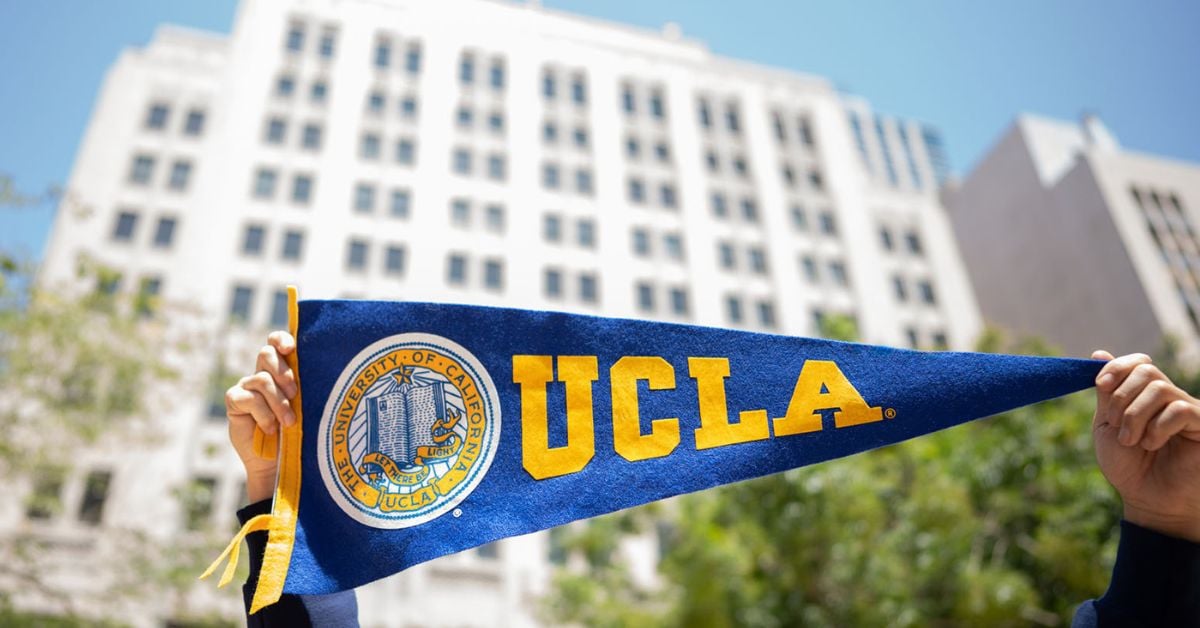
UCLA School of Law stands as one of the premier institutions for trial advocacy law, consistently ranking among the best law schools in the specialty. The school provides rigorous training and unparalleled resources in trial advocacy. UCLA School of Law, established in 1949, is situated in Los Angeles, California, offering students access to diverse legal environments and opportunities. UCLA School of Law offers diverse law degree programs to meet various academic and professional goals. The three-year Juris Doctor (J.D.) prepares students for legal careers through comprehensive education, specializations, and numerous clinics. Lawyers seeking advanced legal study enroll in the one-year Master of Laws (LL.M.) Program, which provides nine specializations. The Master of Legal Studies (M.L.S.) caters to professionals needing legal knowledge, which is available online, hybrid, or on-campus. Pursuing a career in academic law involves enrolling in the Doctor of Juridical Science (S.J.D.) Program, requiring a dissertation and scholarly work.
The acceptance rate for UCLA School of Law for the 2024 academic year is approximately 16.8%. UCLA Law School’s tuition for the 2024-2025 academic year ranges from $59,185 for California residents in the J.D. Program to $73,117 for the LL.M. Program. UCLA School of Law ranks #13 in Best Law Schools. The law school ranks #4 in Trial Advocacy, #5 in Environmental Law, #6 in Tax Law, and #7 in Criminal Law. The school enjoys a strong reputation for academic excellence, innovative programs, and a commitment to public service, attracting top-tier students and faculty from around the globe. UCLA Law significantly impacts national and international legal landscapes, making it one of California best law schools.
UCLA School of Law offers comprehensive specialized programs in trial advocacy law. Students participate in the trial advocacy program, which provides extensive hands-on training. The A. Barry Cappello Program in trial advocacy emphasizes courtroom skills through real-world simulations. Advanced Trial Advocacy Clinics allow students to practice in real courtrooms. The Moot Court Honors Program offers competitive advocacy experiences. Unique features include collaboration with experienced trial attorneys and judges, providing unparalleled practical insights.
Notable faculty in trial advocacy law at UCLA School of Law are highly esteemed for their expertise. Justin Bernstein, Director of the A. Barry Cappello, Program in Trial Advocacy, is renowned for leading UCLA’s trial teams to national prominence. Charles T. Anderson, Lecturer in Law, provides valuable insights into courtroom dynamics. Paul Bergman, Professor of Law Emeritus, has made significant contributions to legal education and trial practice. Ingrid Eagly, a professor of law, offers extensive knowledge of criminal procedure. The faculty members greatly enhance the trial advocacy program.
UCLA School of Law offers numerous clinical opportunities in trial advocacy through the A. Barry Cappello Program in Trial Advocacy. UCLA Veterans Legal Clinic, directed by Professor Sunita Patel, allows students to work on veterans’ cases. The Criminal Justice Program, guided by Professor Ingrid Eagly, provides hands-on experience in criminal law. UCLA’s trial team, ranked #1 nationally, offers participation in national competitions. Trial Advocacy and Advanced Trial Advocacy courses focus on trial process theory and practice. Pretrial Civil Litigation courses enhance training in pretrial procedures and evidence handling.
UCLA School of Law provides numerous networking opportunities for students interested in trial advocacy. Alumni connections through the A. Barry Cappello’s Program in Trial Advocacy offers mentorship and career guidance. Events and lectures, including the Art of the Trial series and the Irving H. Green Memorial Lecture, allow students to learn from experienced practitioners. Mock trial competitions enable students to meet peers and professionals nationally. UCLA Law’s notable alumni include A. Barry Cappello, Kevin Brazile, Rasha Gerges Shields, and Josh Green all exemplify excellence in trial advocacy and related fields.
UCLA School of Law’s advanced and elective trial advocacy courses offer comprehensive training. Trial Advocacy and Advanced Trial Advocacy focus on honing litigation skills, including jury selection, opening statements, and cross-examinations. The Art of the Trial series features leading practitioners sharing strategies and real-world experiences. Pretrial Civil Litigation, Depositions, and Discovery courses provide practical skills in handling pretrial procedures and evidence. The Criminal Justice Program, under Professor Ingrid Eagly, offers hands-on courtroom experience. The Veterans Legal Clinic, directed by Professor Sunita Patel, allows students to work on veterans’ cases. Participation in national mock trial competitions enhances practical advocacy skills. UCLA School of Law’s Class of 2022 achieved a 96.7% employment rate in full-time, long-term positions requiring Bar passage within ten months of graduation. The Class of 2023 saw 90% secure long-term, full-time legal jobs, with 97.2% overall full-time employment.
7. Drexel University Thomas R. Kline School Of Law
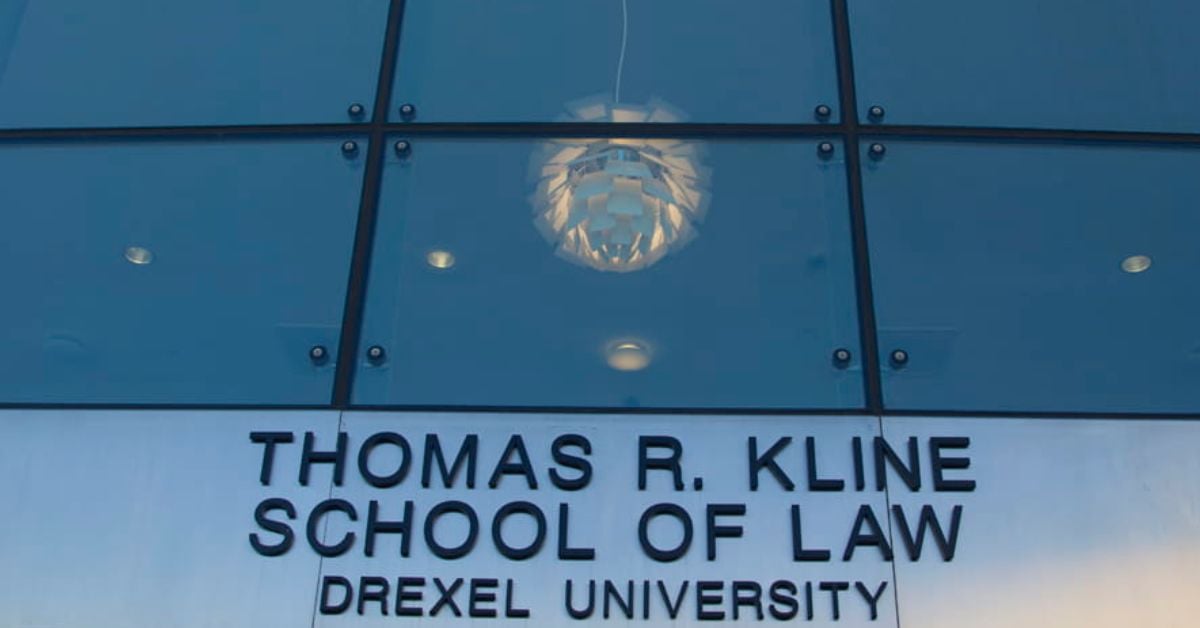
Drexel University’s Thomas R. Kline School of Law excels in Trial Advocacy law and is consistently ranked among the best law schools for the discipline. The law school, established in 2006, offers a robust curriculum designed to equip students with practical skills for courtroom success. The law school, situated in Philadelphia, Pennsylvania, benefits from a vibrant legal community. Drexel University’s Thomas R. Kline School of Law offers diverse law degree programs for various career goals and educational backgrounds. The Traditional JD Program, completed in three years, emphasizes foundational legal education and experiential learning. The Accelerated 2-Year JD provides rigorous academic and experiential opportunities in a shorter time frame. The Global Access JD is for international students with prior legal studies. Specialized LLM degrees in Cyber Law and Data Privacy and dual degrees, including JD/MBA, expand career prospects. Admission requires a Bachelor’s degree, LSAT scores, letters of recommendation, and a personal statement. Practical experience is gained through co-op placements, clinics, and pro bono service.
The acceptance rate for Drexel University’s Thomas R. Kline School of Law for the 2023-2024 academic year is 34.16%. Tuition for the 2024-2025 academic year at Drexel University’s Thomas R. Kline School of Law is $55,200 per year for JD students. Additional fees and estimated living expenses bring the total cost to approximately $83,204 per year for on-campus students. Drexel University’s Thomas R. Kline School of Law ranks #75 in Best Law Schools. The law school ranks #8 in Trial Advocacy, #24 in Health Care Law, #26 in Legal Writing, and #58 in Clinical Training.
The law school provides rigorous academic programs and practical training. The faculty comprises experienced professionals dedicated to student success. Alumni frequently secure prestigious positions in various legal fields, enhancing the school’s reputation.
Drexel University’s Thomas R. Kline School of Law offers specialized programs in trial advocacy law. The programs include advanced courses in trial techniques, litigation strategy, and courtroom performance. Unique features include mock trial competitions and partnerships with practicing attorneys. Students benefit from state-of-the-art trial advocacy facilities and real-world simulation labs. Practical experience through externships and co-op placements further distinguishes the programs. Graduates leave equipped with the skills needed for successful careers in trial advocacy.
Notable faculty in trial advocacy law at Drexel University’s Kline School of Law bring extensive experience to their roles. Philip Pasquarello, Director of trial advocacy, has secured verdicts exceeding $100 million and led competition teams to victory. Gwen Roseman Stern, another Director, directs the Marshall-Brennan Constitutional Literacy Project and has taught trial advocacy at Drexel and Temple. Jared Rosenblatt, Associate Director, is a seasoned prosecutor with over 50 criminal trials. The experts provide unparalleled insights and training in trial advocacy.
Drexel University Thomas R. Kline School of Law offers extensive clinical opportunities in trial advocacy. The Federal Litigation and Appeals Clinic allows students to represent clients in immigration matters before federal courts. The Andy and Gwen Stern Community Lawyering Clinic enables students to assist local residents with legal issues. The Entrepreneurial Law Clinic provides legal advice to start-ups and entrepreneurs. The Civil Litigation Field Clinic focuses on representing survivors of domestic violence. The Criminal Litigation Field Clinic offers comprehensive experience in criminal defense.
Drexel University’s Kline School of Law offers robust networking opportunities in trial advocacy. The trial advocacy program includes national and regional competitions, connecting students with experienced attorneys and judges. The Co-op Program places students in legal environments, building professional contacts. Clinical programs provide hands-on experience and mentorship. Regular events, continuing education programs, and alumni networks enhance networking. Notable alumni include Thomas R. Kline, Philip Pasquarello, and Gwen Roseman Stern, who have significantly contributed to trial advocacy.
Drexel University’s Thomas R. Kline School of Law offers comprehensive courses in trial advocacy law. Advanced Trial Advocacy focuses on refining courtroom skills through simulations. Evidence covers the rules and application of evidence in trials. Litigation Drafting teaches the creation of key legal documents. Deposition Practice provides hands-on training in taking and defending depositions. The Trial Team course prepares students for national competitions. Criminal Litigation involves practical experiences in criminal court settings. Civil Litigation emphasizes strategies and procedures for civil cases. Students gain a robust understanding of trial advocacy through the specialized courses. Drexel University’s Thomas R. Kline School of Law boasts strong employment outcomes, with 90.7% of the Class of 2023 securing full-time, long-term positions. The Career Strategies Office provides career advising, networking programs, workshops, and job fairs to support students and alumni.
8. South Texas College Of Law Houston
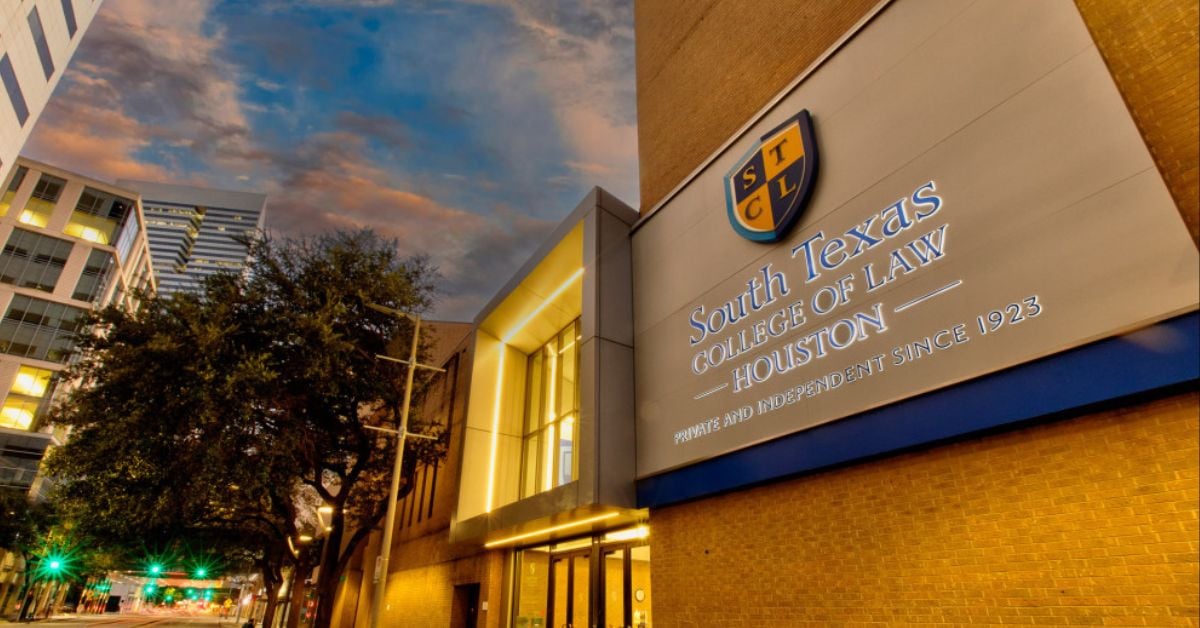
South Texas College of Law Houston is renowned as one of the best law schools for trial advocacy law. Students benefit from a curriculum designed to excel in trial advocacy, gaining practical skills through mock trials and moot court competitions. The school, established in 1923, is located in Houston, Texas, providing students with access to a vibrant legal community. South Texas College of Law Houston offers several law degree programs tailored to various student needs. The traditional full-time J.D. program combines classroom instruction with practical skills through case studies, role-playing, writing, research, and analysis. Participation in mock trials, moot courts, and legal clinics helps apply classroom knowledge to real-world cases. The part-time campus program holds classes four evenings weekly for students balancing personal and professional commitments. An online part-time program includes an in-person residency each academic year, with the rest of the coursework online. Practical experience is emphasized through a nationally recognized advocacy program, legal clinics, and externships, where students work on actual cases.
The acceptance rate at South Texas College of Law Houston for the academic year 2023-2024 is approximately 44.04%. The tuition for full-time students at South Texas College of Law Houston is $41,110 for the 2023-2024 academic year, while part-time students pay $27,740. 70.80% of full-time students receive grants and scholarships, averaging $10,000, to help offset costs. South Texas College of Law Houston ranks #150 in Best Law Schools and #48 in Part-time Law. The school is ranked #6 in Trial Advocacy, #18 in Dispute Resolution, #32 in Legal Writing, and #116 in Constitutional Law. South Texas College of Law Houston stands out among Texas best law schools. The school is recognized for its rigorous curriculum, experienced faculty, and extensive alumni network, contributing to excellent employment outcomes for graduates.
South Texas College of Law Houston offers specialized programs in trial advocacy law. The unique advocacy program includes national and international moot court competitions. Students participate in mock trials to hone courtroom skills. The school provides simulation courses to develop real-world litigation abilities. The advocacy program boasts multiple national championships. An extensive externship network offers hands-on experience. Students engage in intensive trial practice sessions. The program’s comprehensive approach ensures top-tier trial advocacy training.
Notable faculty in trial advocacy law at South Texas College of Law Houston bring extensive expertise to their students. Elaine A. Carlson, the Stanley J. Krist Distinguished Professor of Law, specializes in Texas Pretrial Procedure and Texas Trial and Appellate Procedure. Maxine D. Goodman, a professor since 2002, has deep experience in complex litigation and legal research and writing. The distinguished faculty members enhance the Advocacy Program with their profound knowledge and practical experience, preparing students for successful legal careers.
Clinical opportunities in trial advocacy at South Texas College of Law Houston provide students with extensive real-world lawyering experience. Randall O. Sorrels Legal Clinics cover civil practice, transactional work, and specialized justice issues. Criminal justice clinics offer prosecution and defense experience, including actual innocence cases. Externships place students in federal, state, and county courts, as well as corporate and nonprofit legal departments. The Pro Bono Program recognizes students contributing 50 hours of service, enhancing their practical legal skills and community impact.
South Texas College of Law Houston offers numerous networking opportunities. The Alumni Association Board of Directors, consisting of prominent legal leaders, supports the law school’s mission and students. The annual South Texas Mock Trial Challenge attracts students nationwide, enhancing their trial advocacy skills while networking with practicing attorneys, alumni, and judges. The Advocacy Program hosts various events throughout the year, allowing students to engage with peers, faculty, and legal professionals. Notable alumni include Drew Barnett Tipton, a U.S. District Judge, and Donald W. Washington, former U.S. Marshals Service Director. Joan Huffman, Texas State Senator, and Harris County District Attorney Kim Ogg are distinguished graduates in trial advocacy law.
South Texas College of Law Houston offers advanced courses and electives in trial advocacy law. The curriculum includes Advanced Trial Advocacy, focusing on complex litigation strategies and courtroom techniques. Evidence and Procedure courses provide an in-depth understanding of the rules governing legal proceedings. Negotiation and Mediation emphasize alternative dispute resolution methods. Students enroll in Criminal Procedure, Civil Litigation, and Appellate Advocacy. Practical skills are honed through participation in mock trials, moot court competitions, and legal clinics. Faculty experienced in trial advocacy provide mentorship and real-world insights. The courses prepare students for successful careers in trial advocacy law. South Texas College of Law Houston boasts strong employment outcomes, with 77.1% of the class of 2023 securing long-term, full-time legal jobs. 86% of graduates found full-time positions.
9. Loyola Law School
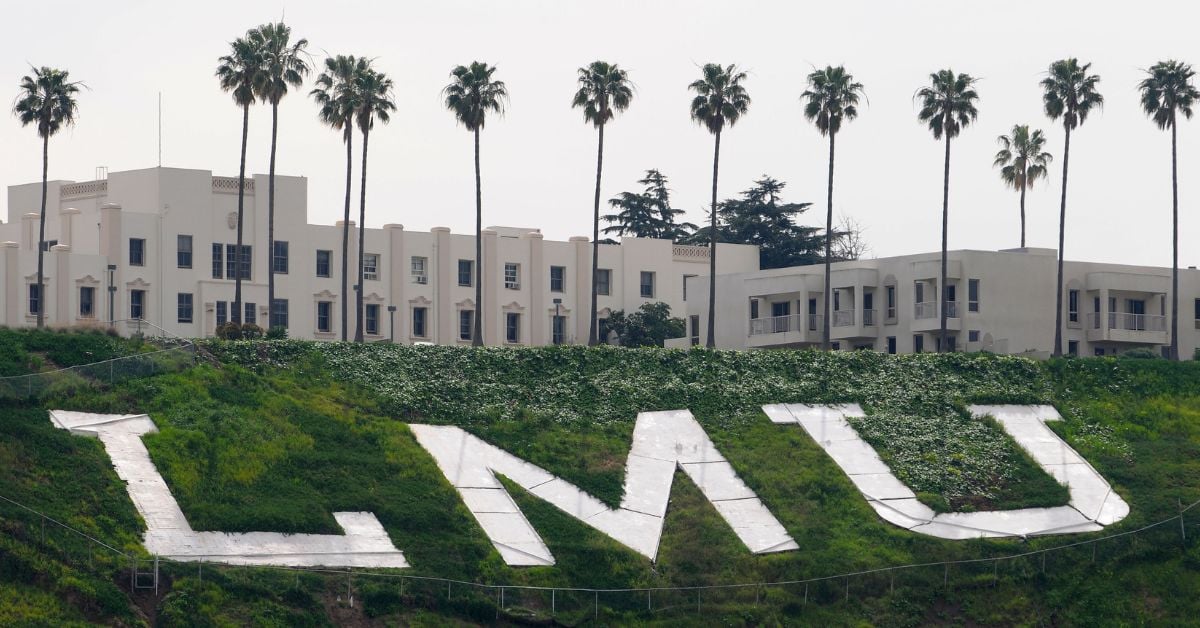
Loyola Marymount University’s Loyola Law School is one of the best law schools for trial advocacy law, ranked #8 in the specialty. The law school, established in 1920, is in Los Angeles, California. Loyola Marymount University’s Loyola Law School offers a variety of law degree programs. The Juris Doctor (JD) day program is a full-time, three-year course, while the JD evening program, aimed at balancing studies with other responsibilities, spans four years. The four-year JD/MBA Program combines legal and business education. Students pursue a JD/Tax LLM in three years or a 4.5-year MA/JD for current LMU Masters in Education students. Specializations like the Tax LLM are available on-campus or online. The advanced Doctor of Juridical Science (JSD) caters to individuals seeking academic or high-level policy work in law.
The acceptance rate for Loyola Marymount University’s Loyola Law School for the 2024 admissions cycle is approximately 34.4%. The tuition fee for Loyola Marymount University’s Loyola Law School in 2024 is $67,490 for JD Day Students and $50,090 for JD evening students. The estimated total cost of attendance is approximately $113,714 for JD day students and $96,038 for JD evening students. Loyola Marymount University’s Loyola Law School ranks #61 in Best Law Schools and #6 in Part-time Law. The school is #8 in Trial Advocacy, #34 in Criminal Law, and #13 in Tax Law.
Loyola Law School is renowned for strong trial advocacy and tax law programs, consistently achieving high rankings in the specialties. The school’s commitment to practical skills and excellence in legal education contributes to its respected reputation.
Loyola Marymount University’s Loyola Law School offers specialized programs in trial advocacy law. Students benefit from extensive practical training through simulated courtroom exercises. The programs include intensive workshops on pretrial and trial techniques. Real-world experience is gained through participation in actual court proceedings. Cutting-edge technology is used to enhance courtroom presentations. Unique features include the use of professional actors for witness simulations. Students receive mentorship from experienced trial lawyers. The programs prepare students thoroughly for a career in trial advocacy.
Notable faculty in trial advocacy law at Loyola Marymount University’s Loyola Law School are highly regarded. Professor Susan Poehls directs Trial Advocacy Programs, leading the teams to numerous victories. Professor Gary Craig offers practical litigation experience through clinical education. Professor Sean Kennedy’s background in public defense enriches students’ practical training. Professor Laurie Levenson, a former federal prosecutor, is esteemed for her trial advocacy and legal ethics expertise. The accomplished faculty members significantly contribute to Loyola’s esteemed reputation in trial advocacy.
Loyola Marymount University’s Loyola Law School provides numerous networking opportunities and notable alumni in trial advocacy. The Alumni Association offers access to an online directory, event invitations, and publications. Participation in the Byrne Trial Advocacy Team provides extensive networking through competitions and events. Moot court and advocacy programs allow students to connect with judges and legal professionals. Notable alumni include Mark Geragos, a high-profile defense attorney, and Tom Girardi, a distinguished trial lawyer. Two hundred alumni serve as trial court judges in Southern California, enhancing valuable connections and mentorship opportunities.
Loyola Marymount University’s Loyola Law School offers advanced and elective courses in trial advocacy law, providing a comprehensive curriculum. Advanced Trial Advocacy focuses on refining courtroom skills and complex litigation strategies. Evidence courses delve into rules and practical applications in trials. Jury Selection and Voir Dire emphasize effective jury selection techniques. Appellate Advocacy hones skills in handling appeals and persuasive brief writing. Expert Witnesses courses train students to work with and cross-examine experts. Litigation Practice and Procedure covers procedural aspects of trial practice. The courses equip students with practical skills essential for successful trial advocacy careers. Loyola Law School reports a 90.51% employment rate for the class of 2023, with 80.38% in positions requiring Bar passage. Law firms employed 70.98% of graduates, while 10.49% worked in public interest roles, and 3.85% were in government positions.
10. Mercer University School Of Law
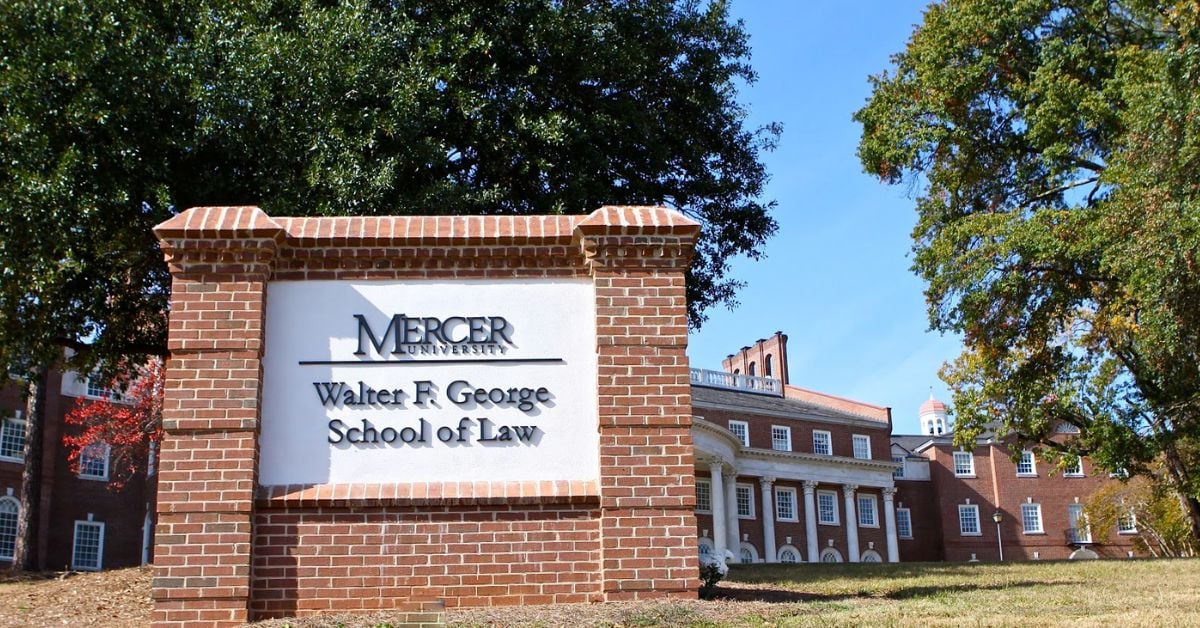
Mercer University School of Law, known for its excellence in Trial Advocacy, has a strong reputation for preparing students for courtroom success. The law school, established in 1873, consistently ranks among the top for trial advocacy. The law school, located in Macon, Georgia, offers a balanced legal education with theory and practical experience. Mercer University School of Law in Macon, Georgia, offers a comprehensive legal education focused on producing practice-ready lawyers. The JD program requires 89 credit hours, emphasizing experiential learning through clinics, externships, and simulation courses. The JD/MBA program, in collaboration with Mercer’s Stetson-Hatcher School of Business, allows students to earn degrees in three years. The school is renowned for its Legal Writing and Advocacy programs and offers public interest and judicial externships. Students benefit from small class sizes, dedicated faculty, and extensive career services support, ensuring strong post-graduation employment outcomes.
The acceptance rate for Mercer University School of Law in Macon, Georgia, for the academic year 2023-2024 is approximately 46.98%. Mercer University School of Law’s tuition and fees for 2023-2024 are $43,132, with a total estimated cost of attendance of $61,283. 93.16% of full-time students receive grants or scholarships, averaging $16,000.
Mercer University School of Law ranks #103 among the Best Law Schools. The law school holds notable specialty rankings, including #8 in Trial Advocacy, #26 in Legal Writing, #137 in Criminal Law, and #121 in Health Care Law. Mercer University School of Law is known as one of Georgia best law schools among other institutions. Mercer Law has a strong reputation for producing practice-ready lawyers. The school’s emphasis on experiential learning and its highly ranked programs reflect a commitment to academic excellence and practical skills, preparing graduates for successful legal careers.
University School of Law in Macon, Georgia, offers specialized programs in trial advocacy law. The programs provide intensive training through moot court and mock trial competitions. Students participate in hands-on experiences, developing litigation skills crucial for trial advocacy. The program includes advanced courses in evidence, trial practice, and pre-trial litigation. Unique features include national rankings and a strong focus on experiential learning. Opportunities to work with seasoned litigators and judges enhance practical skills and professional readiness.
Notable faculty in trial advocacy law at Mercer University School of Law include distinguished educators and accomplished trial lawyers. Professor Deryl Dantzler holds the Tommy Malone Distinguished Chair in trial advocacy. Deryl has directed the trial advocacy program for many years, leading to high rankings and numerous awards. Students benefit from their real-world expertise and dedication to legal education. Faculty members significantly enhance the trial advocacy program’s reputation and effectiveness.
Mercer University School of Law offers various clinical opportunities in trial advocacy, providing hands-on legal experience. The Domestic Violence Clinic allows students to represent victims in cases involving Temporary Protective Orders under Professor Bonnie Carlson’s supervision. The Mercer Advocacy Council offers students the chance to participate in mock trials and moot court competitions. Externships enable students to work with practicing lawyers and judges, gaining real-world experience. The clinical programs develop litigation skills, preparing students for successful careers in trial law.
Mercer University School of Law offers extensive networking opportunities through various programs and events. Mercer Advocacy Council sponsors teams competing in national competitions, fostering connections within the legal advocacy community. Mercer Law’s Alumni Association organizes the Annual Alumni Dinner to connect graduates and current students. Experiential learning programs, including clinics and externships, allow students to work with practicing attorneys and judges. Notable alumni include Griffin B. Bell, Neil Skene, and Jerry Boykin, who have significantly contributed to trial advocacy and beyond.
Mercer University School of Law offers a comprehensive trial advocacy law curriculum featuring advanced and elective courses. Students enroll in Trial Practice, focusing on litigation techniques and courtroom procedures. Advanced Trial Advocacy delves into complex trial issues and strategies. The Problems in Trial Evidence course addresses evidentiary challenges in trials. Students participate in Mock Trial Competitions, honing their practical skills. Specialized clinics, such as the Domestic Violence Clinic, provide hands-on experience. Externships allow students to work with practicing attorneys and judges, enhancing their real-world knowledge and professional networks. The courses prepare students for successful careers in trial advocacy. Mercer University School of Law’s class of 2023 secured long-term, full-time legal jobs at 86.1%, with an overall employment rate of 94.3%. Law graduates work in law firms, government roles, public interest positions, and clerkships.
How To Choose The Best Law School For Trial Advocacy?
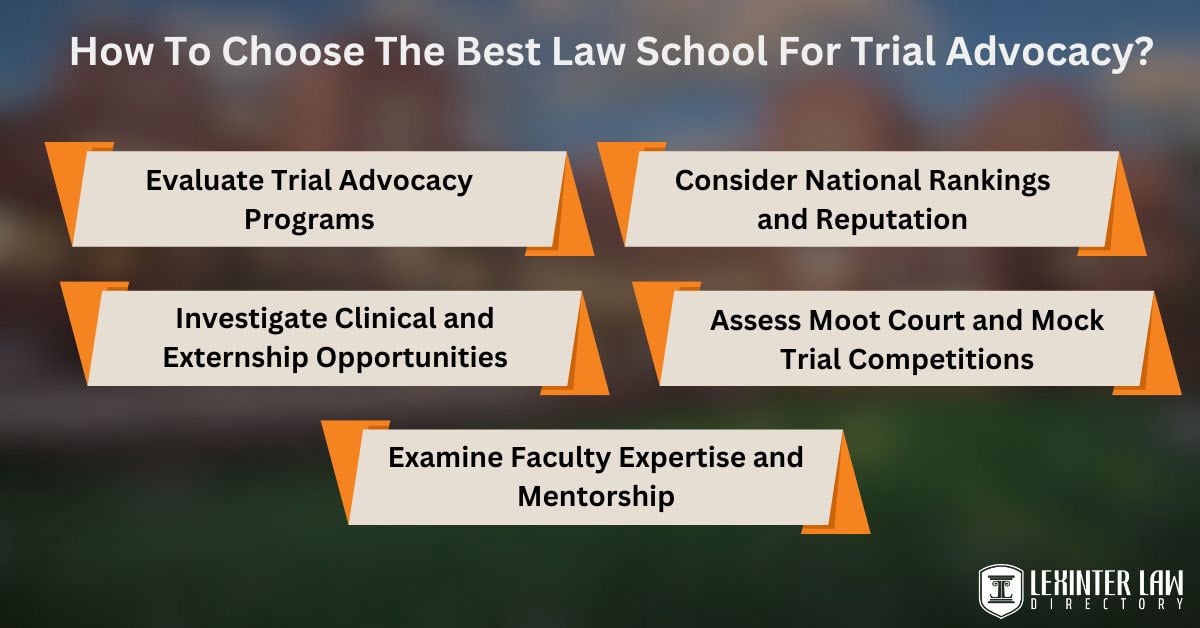
To choose the best law school for trial advocacy, follow the five steps listed below.
- Evaluate Trial Advocacy Programs. Research the law school’s trial advocacy program thoroughly. Look for a curriculum focused on litigation skills, including courses on evidence, trial practice, and courtroom procedures. A strong program offers hands-on experiences through mock trials, moot court competitions, and internships with law firms or public defenders’ offices. Ensure faculty members have substantial trial experience to provide practical insights and mentorship.
- Consider National Rankings and Reputation. Examine national rankings and reputation specifically for trial advocacy. Publications like U.S. News & World Report rank law schools based on their trial advocacy programs. High-ranking schools have robust networks, better resources, and a history of successful graduates. Alumni success in trial advocacy reflects the quality of the education and training received.
- Investigate Clinical and Externship Opportunities. Look for schools offering extensive clinical programs and externship opportunities. Practical experience is crucial for developing trial skills. Clinics that allow students to represent real clients under supervision provide invaluable hands-on learning. Externships with judges, prosecutors, or defense attorneys expose students to real-world legal environments and professional networking opportunities.
- Assess Moot Court and Mock Trial Competitions. Review the law school’s involvement in moot court and mock trial competitions. Participation in national and regional competitions enhances practical skills and provides recognition. Schools with successful teams have dedicated resources, experienced coaches, and a culture that supports and values trial advocacy. Success in the competitions indicates a strong emphasis on trial practice.
- Examine Faculty Expertise and Mentorship. Analyze the expertise and background of the faculty teaching trial advocacy. Professors with significant trial experience, including former prosecutors, defense attorneys, and judges, offer real-world perspectives. Mentorship from renowned faculty is instrumental in developing effective trial strategies and courtroom demeanor. Faculty involvement in professional organizations and ongoing legal practice further enrich the learning experience.
What Is Trial Advocacy?
Trial advocacy is the art of preparing and presenting cases in court. Lawyers who excel in the field possess skills in legal research, persuasive communication, and strategic thinking. A trial advocacy degree equips students with the expertise to argue cases effectively. Practical experience is emphasized, involving mock trials and simulations to hone courtroom skills. Law schools offer trial advocacy programs on litigation processes, evidence handling, and client representation. The programs prepare students for real-world legal challenges, enabling them to develop strong arguments and present compelling cases. Graduates with a trial advocacy degree pursue careers as trial lawyers, public defenders, or prosecutors. Mastery in the field requires dedication and rigorous training, making the programs crucial for individuals aiming to excel in legal practice.
Trial advocacy law covers a broad range of topics essential for effective courtroom representation. The field focuses on the development of skills necessary for trial preparation and litigation. Students learn to draft pleadings, motions, and briefs, essential documents that form the foundation of any legal case. Effective trial advocacy involves mastering the art of oral arguments, enabling lawyers to present their cases to judges and juries persuasively. Instruction in trial advocacy law includes the study of evidentiary rules. Understanding the rules allows advocates to know what evidence is admissible and how to object to inadmissible evidence strategically. The area covers witness examination techniques, direct and cross-examination, and teaching how to elicit favorable testimony and undermine opposing witnesses. Ethical considerations form another crucial component in trial advocacy law. Lawyers must navigate the complex ethical landscape, advocating zealously while maintaining professional integrity. Trial advocacy law encompasses jury selection processes, known as voir dire, critical for shaping a jury favorable to the client’s case. Trial advocacy law prepares students for criminal trials, civil litigation, family court, and other legal arenas. Students become adept at managing all trial phases through comprehensive training in the areas. The training, covering pre-trial motions and closing arguments, ensures they are well-equipped to achieve favorable client outcomes.
What Is The Main Goal Of Trial Advocacy?
The main goal of trial advocacy is to effectively represent and advocate for a client’s interests in a court of law. The practice involves mastering techniques for presenting evidence, examining witnesses, and crafting compelling arguments. The primary purpose of trial advocacy centers on ensuring that lawyers present their cases persuasively to judges and juries. Effective trial advocacy requires a deep understanding of procedural rules and thinking quickly and strategically during courtroom proceedings. Lawyers must develop strong communication skills to articulate their client’s position clearly and convincingly. Another crucial purpose includes honing the ability to cross-examine witnesses effectively, identifying inconsistencies, and challenging the credibility of opposing testimonies. Mastery of the skills significantly influences the outcome of a trial, highlighting the importance of thorough preparation and practice. Trial advocacy involves understanding and adhering to ethical standards, ensuring that the pursuit of justice remains paramount. The law serves to instill confidence in legal practitioners, enabling them to handle the pressures of trial work with competence. The purpose of trial advocacy is to ensure that legal representatives are well-prepared to advocate for their client’s rights and interests, facilitating a fair and just legal process.
Trial advocacy works through a systematic process that equips lawyers with the skills necessary to present a case effectively in court. The process involves rigorous training in various techniques, including opening statements, direct and cross-examinations, and closing arguments. Training programs and moot court competitions provide practical experience, simulating real courtroom scenarios. Lawyers practice questioning witnesses to draw out favorable testimony and to challenge the opposition’s case. Learning to present and object to evidence according to legal standards forms a crucial part of the process. Active listening and quick thinking are essential, as lawyers must respond effectively to unexpected developments during a trial. Lawyers learn to utilize storytelling to make their cases compelling and understandable to a jury. Preparation involves extensive research and understanding the intricacies of the case, as well as anticipating counterarguments. Mock trials offer a platform to practice the skills under the guidance of experienced mentors. Developing a strong courtroom presence, including confident body language and clear speech, helps lawyers to persuade judges and juries. Ethical considerations remain a central focus, ensuring lawyers uphold justice while advocating zealously for their clients. Trial advocacy, through continuous practice and feedback, transforms theoretical knowledge into practical expertise, preparing lawyers to navigate the complexities of real-world litigation effectively.
What Is The Benefit Of Trial Advocacy?
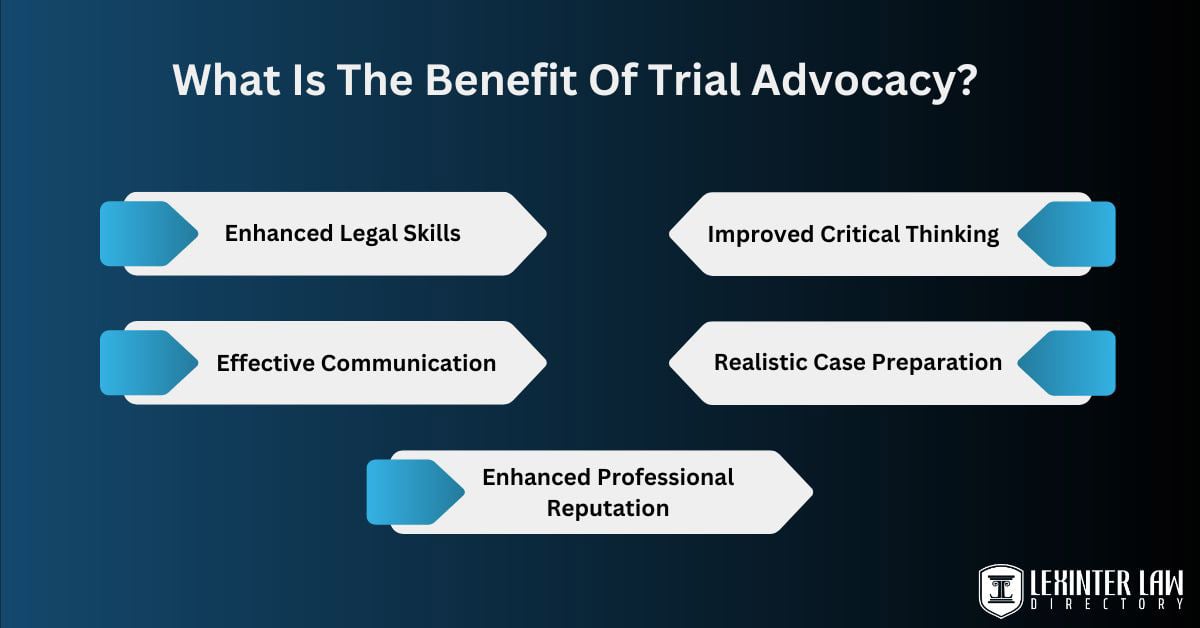
The five benefits of trial advocacy are listed below.
- Enhanced Legal Skills: Participating in trial advocacy hones essential legal skills. Practicing in a simulated courtroom environment allows lawyers to develop proficiency in questioning witnesses, presenting evidence, and delivering persuasive arguments. The hands-on experience translates to increased competence and confidence in actual court proceedings.
- Improved Critical Thinking: Engaging in trial advocacy requires sharp analytical abilities. Lawyers must quickly assess evidence, anticipate opposing arguments, and formulate effective strategies. The rigorous mental exercise enhances their critical thinking skills, enabling them to navigate complex legal issues more precisely.
- Effective Communication: Trial advocacy emphasizes the importance of clear and persuasive communication. Lawyers learn to articulate their arguments succinctly and compellingly, tailoring their language to suit judges and juries. Mastering communication techniques is crucial for influencing court decisions and achieving favorable client outcomes.
- Realistic Case Preparation: Experiencing the trial process through advocacy exercises provides invaluable insights into case preparation. Lawyers become adept at organizing case files, managing trial logistics, and adapting to unexpected developments. The thorough preparation ensures they are well-equipped to handle the dynamic nature of real trials.
- Enhanced Professional Reputation: Success in trial advocacy significantly boosts a lawyer’s professional standing. Demonstrating proficiency in trial techniques and achieving favorable verdicts builds a strong reputation among peers and clients. The enhanced reputation leads to increased career opportunities and greater client trust in their legal expertise.
Which Degree Is Best For Trial Advocacy Lawyer?
The LL.M. program in trial advocacy is the best degree for a trial advocacy lawyer. The LL.M. program in trial advocacy stands out as the premier degree for trial advocacy lawyers due to its specialized curriculum and practical training. The program immerses lawyers in the nuances of courtroom procedures, offering hands-on experience through mock trials, simulations, and direct engagement with experienced trial attorneys. Mastery of trial advocacy techniques, including persuasive argumentation, effective witness examination, and compelling storytelling, gets honed through rigorous practical exercises. Lawyers benefit from an advanced understanding of evidence law, trial strategy, and jury psychology, all integral components of the LL.M. curriculum. The expertise enhances lawyers’ litigation skills, boosting their confidence and effectiveness in court. The program includes courses on the ethical considerations of trial practice, ensuring lawyers uphold the highest professional standards.
Networking opportunities with seasoned litigators and legal professionals are a significant advantage, providing mentorship and career advancement prospects. Graduates of the LL.M. program in trial advocacy become highly skilled in crafting and presenting arguments, which increases their success rate in trials. The degree ensures lawyers are well-equipped to handle complex litigation, making them valuable assets in legal proceedings and significantly enhancing their career trajectory.
How To Become A Trial Advocacy Lawyer?
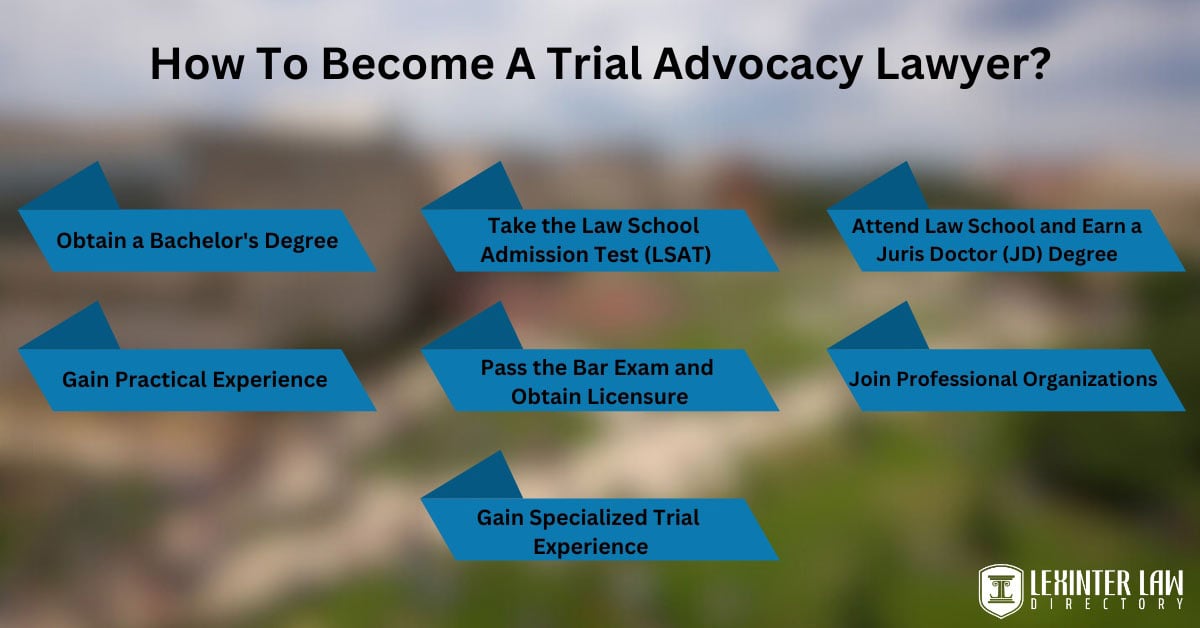
The seven steps to becoming a trial advocacy lawyer are listed below.
- Obtain a Bachelor’s Degree. Aspiring trial advocacy lawyers need to start with a Bachelor’s degree. Political science, history, or English courses enhance critical thinking and communication skills. Participating in debate clubs and internships at legal institutions provides valuable experience. Academic excellence is crucial when applying to law schools.
- Take the Law School Admission Test (LSAT). Performing well on the LSAT is essential for admission to law school. The LSAT assesses reading comprehension, analytical reasoning, and logical reasoning skills, which are crucial for a trial advocacy lawyer. Preparing thoroughly by using study guides, prep courses, or tutoring improves test scores. High LSAT scores increase the chances of being accepted into prestigious law schools.
- Attend Law School and Earn a Juris Doctor (JD) Degree. Enroll in a law school accredited by the American Bar Association (ABA) to earn a trial advocacy degree. Focus on courses emphasizing trial advocacy, such as evidence, civil procedure, and trial practice. Participating in moot court competitions and legal clinics offers practical experience. Engaging in internships or clerkships with law firms specializing in litigation provides valuable hands-on training.
- Gain Practical Experience through Internships and Clerkships. Practical experience is crucial for developing trial advocacy skills. Internships and clerkships with law firms, government agencies, or judges offer exposure to courtroom procedures and case management. The experiences allow aspiring trial advocacy lawyers to observe seasoned attorneys, understand the dynamics of a trial, and refine their litigation strategies under real-world conditions.
- Pass the Bar Exam and Obtain Licensure. Passing the Bar exam is mandatory to practice law. Each state has its own exam, but all assess knowledge of general legal principles and specific state laws. Comprehensive study and review courses help in preparation. Apply for licensure through the state Bar Association once the Bar exam is passed. Licensure is required to practice law and represent clients in court.
- Join Professional Organizations and Continue Education. Membership in professional organizations, such as the American Association for Justice (AAJ) or local Bar associations, provides networking opportunities, resources, and continuing education. Attend workshops, seminars, and conferences focused on trial advocacy. Continuing education ensures that skills remain sharp and updated with the latest legal practices and technologies, enhancing courtroom effectiveness.
- Gain Specialized Trial Experience. Building a reputation as a trial advocacy lawyer requires gaining specialized trial experience. Work on a variety of cases, from criminal defense to civil litigation, to develop a broad skill set. Seek mentorship from experienced trial lawyers to learn advanced techniques. Demonstrating proficiency in trial preparation, client representation, and courtroom performance establishes credibility and attracts more clients.
How Long Would It Take To Study Trial Advocacy?
It would take at least seven years to study trial advocacy law. Studying trial advocacy requires a substantial commitment, beginning with a four-year undergraduate degree. Law schools mandate an undergraduate degree before admission to a Juris Doctor (JD) program. Completing a JD program generally requires three years of dedicated legal study. Students take courses focusing on various aspects of the law, including trial advocacy during the years. The first year of law school, referred to as 1L, includes foundational courses such as contracts, torts, civil procedure, and criminal law. The courses build a base for understanding the legal system and developing critical thinking skills. Students in the second year of law school, or 2L, begin to take more specialized courses, including trial advocacy. Participation in moot court and mock trial competitions is highly encouraged. The activities provide practical experience and help students develop their litigation skills. The third year of law school, known as 3L, includes advanced trial advocacy courses and clinical experiences. Students work in legal clinics or internships, gaining hands-on experience in courtroom settings. The year is crucial for honing advocacy skills and preparing for the Bar exam.
Graduating from law school is just one step; aspiring trial lawyers must pass the Bar exam. Preparing for the Bar exam usually takes several months and involves intensive study and review courses. The period is critical for ensuring a comprehensive understanding of the law and readiness for the exam. Developing a successful career in trial advocacy involves continuous learning and practical experience. Trial lawyers join professional organizations, attending workshops and conferences to stay updated on the latest trends. Engaging with the legal community and participating in the events is crucial for professional growth. The timeline for studying trial advocacy spans at least seven years: four years for an undergraduate degree and three years for law school.
What Is The Average LSAT For Trial Advocacy?
The average LSAT for trial advocacy is around 158 to 164, reflecting the competitive nature of admissions to top programs. Baylor University Law School boasts a median LSAT of 164, with the 25th-75th percentile range from 160 to 165. Students admitted here have a strong median GPA of 3.73. Temple University Beasley School of Law usually sees a median LSAT ranging from 158 to 162, varying by year. The scores demonstrate the school’s competitive edge in selecting candidates. Stetson University College of Law has a median LSAT, generally falling between 155 and 160, and is renowned for its excellence in trial advocacy and legal writing. South Texas College of Law Houston, known for practical skills training, records a median LSAT of 156. Prospective students aiming for the prestigious trail advocacy programs must target LSAT scores within the mid to high 150s and low 160s, coupled with strong academic performance.
The LSAT, or Law School Admission Test, evaluates skills necessary for success in law school, such as reading comprehension, analytical reasoning, and logical reasoning. The test, administered by the LSAC, comprises five sections: two logical reasoning, analytical reasoning, reading comprehension, and an unscored variable section. An LSAT score ranges from 120 to 180, reflecting performance. LSAT percentile score illustrates how a score compares to others; for example, a 170 is in the 97th percentile, meaning it is higher than 97% of all test-taker’s scores. The metrics help law schools assess applicants relative to one another effectively. The LSAT is a critical component of law school admissions. Maintaining a robust GPA throughout undergraduate studies is crucial. Emphasis on high LSAT scores highlights the importance placed on analytical reasoning and logical thinking, core skills necessary for trial advocacy. Aspiring candidates must prepare diligently to meet the rigorous admission standards, ensuring a competitive application for enrollment in leading trial advocacy law schools.
Is Trial Advocacy Difficult?
Yes, trial advocacy is difficult. Trial advocacy presents numerous challenges, demanding a deep understanding of law, exceptional communication skills, and strategic thinking. Mastering complex legal principles and procedures requires extensive education and continuous learning. Crafting persuasive arguments involves knowledge of the law and the ability to analyze facts and foresee opposing arguments. Effective trial lawyers must exhibit strong public speaking abilities, ensuring clarity and confidence in their delivery to juries and judges. Handling the unpredictable nature of trials is another difficulty. Witnesses provide unexpected testimony, requiring quick adaptation and a keen ability to think on one’s feet. Lawyers must prepare for cross-examinations, anticipating and countering every possible answer. Managing the extensive documentation and evidence involved in trials demands exceptional organizational skills.
Emotional intelligence plays a critical role, as understanding and connecting with juries and witnesses significantly influences outcomes. Lawyers face high-stress environments, balancing multiple cases and working long hours to meet stringent deadlines. Ethical considerations add another layer of complexity, as trial lawyers must navigate their duties to clients while upholding the judicial system’s integrity. Combining the elements makes trial advocacy a highly demanding and hard field.
What Can You Expect From A Career As A Trial Advocacy Lawyer?
You can expect substantial financial rewards, career growth, professional development, and a dynamic work environment from a career as a trial advocacy lawyer. The role demands strong communication and analytical skills, resilience, and the ability to perform under pressure. A career as a trial advocacy lawyer offers substantial financial rewards, with salaries generally ranging from $60,000 to over $200,000 annually, depending on experience, location, and the size of the law firm. Entry-level lawyers earn on the lower end of the spectrum, while lawyers with extensive experience working at prestigious firms command significantly higher salaries. Benefits include health insurance, retirement plans, paid time off, and professional development opportunities. Lawyers in the field frequently enjoy career growth through specialization and reputation building. Successful trial advocacy lawyers transition to roles as judges, legal consultants, or educators, offering further career diversification and advancement.
Professional development is critical, involving continuous learning and skill enhancement. Engaging in ongoing legal education, attending workshops, and participating in mock trials and seminars are crucial for staying updated with the latest legal precedents and trial techniques. Networking within the legal community provides opportunities for career advancement and client acquisition. Trial advocacy lawyers work in a dynamic and demanding environment. Preparing cases for trial requires extensive research, evidence gathering, and strategy development. Strong communication and analytical skills are essential, as is the ability to perform under pressure. The role demands a high level of commitment and resilience, given the unpredictable nature of court schedules and case outcomes. A career in trial advocacy law offers lucrative financial prospects, comprehensive benefits, and significant opportunities for professional growth. The role’s demanding nature is balanced by the potential for personal and professional fulfillment through successful legal advocacy and justice administration.
What Is The Difference Between Trial Advocacy Lawyers And Human Rights Lawyers?
The difference between a trial advocacy lawyer and a human rights lawyer is rooted in their areas of specialization and primary objectives. Trial advocacy lawyers focus on representing clients in court, aiming to persuade a judge or jury in civil or criminal cases. The lawyers develop strategies, present evidence, and cross-examine witnesses to defend or prosecute clients effectively. Human rights lawyers, on the other hand, dedicate their efforts to defending individuals’ fundamental rights and freedoms. The lawyers engage in cases related to discrimination, abuse, and injustice. Human rights lawyer’s work includes filing lawsuits, advising on policy, and raising public awareness to ensure the protection and promotion of human rights. Trial advocacy lawyers prioritize courtroom skills and litigation techniques, while human rights lawyers concentrate on upholding ethical standards and legal protections for vulnerable populations.
The similarities between a trial advocacy lawyer and a human rights law attorney are rooted in their dedication to justice and legal expertise. Trial advocacy lawyers excel in courtroom litigation, using persuasive techniques and thorough knowledge of the law to represent clients in civil or criminal cases. Human rights lawyers focus on defending fundamental rights and freedoms, addressing discrimination and abuse through legal channels. Trial advocacy lawyers and human rights lawyers must possess strong analytical skills, an understanding of legal procedures, and the ability to build compelling cases. Each type of lawyer works on high-stakes cases, requiring extensive preparation and the ability to handle complex legal arguments. The lawyers collaborate with various stakeholders, including clients, witnesses, and other legal professionals, to achieve favorable outcomes. The lawyer’s commitment to upholding the rule of law and ensuring fair treatment underlies the essential role they play in the legal system.
How Do Trial Advocacy Lawyers Earn?
Trial advocacy lawyers earn through various income channels, including handling cases, teaching, and other professional activities. Handling cases remains the primary income source. Lawyers charge hourly rates for their services, which range from $200 to $800 per hour, depending on their experience, location, and the complexity of the case. Specialized or high-profile lawyers charge rates exceeding $1,000 per hour. Lawyers who work on a contingency basis receive a percentage of the settlement or judgment, generally between 25% and 40%. Successful large settlements or verdicts result in substantial earnings, reaching millions of dollars. Annual earnings for trial advocacy lawyers vary significantly based on their success, reputation, and geographical location. Trial lawyers earn between $60,000 and $200,000 per year. Successful lawyers, especially lawyers handling high-stakes cases or working in large metropolitan areas, earn upwards of $500,000 to several million dollars annually. Understanding the different income channels reveals the diverse financial landscape within the legal profession.
Teaching law courses at universities or conducting seminars provides another income stream. Trial lawyers share their expertise through adjunct professorships or guest lectures, earning between $1,000 and $5,000 per course or event. Writing legal books and articles or providing commentary for media outlets supplements their income. The activities bring in several thousand dollars, depending on the publication’s reach and the lawyer’s prominence. Speaking engagements and participating in legal conferences or workshops offer additional revenue. Lawyers earn between $500 and $10,000 per speaking event, depending on the audience and the event’s prestige. Serving as legal consultants for corporations or media productions adds another layer of income, with fees varying widely based on the project’s scope and the lawyer’s expertise.
Where Do Trial Advocacy Lawyers Work?
Trial advocacy lawyers work in courtrooms, law firms, corporate legal departments, government agencies, and nonprofit organizations, each offering unique responsibilities and experiences. Courtrooms serve as the most visible workplace for lawyers. Trial advocacy lawyers present cases before judges and juries, argue motions, and cross-examine witnesses. The courtroom environment demands quick thinking, strong public speaking skills, and a deep understanding of legal procedures. Law firms, varying in size from small boutiques to large multinational entities, employ many trial lawyers. Lawyers within a trial advocacy law firm prepare cases by researching legal precedents, drafting legal documents, and strategizing with clients. Collaborative work with paralegals, investigators, and other attorneys is common, emphasizing teamwork and communication.
Corporate legal departments employ trial lawyers to handle litigation matters involving the company. The lawyers protect the company’s interests by managing lawsuits, negotiating settlements, and ensuring compliance with regulations. Interaction with various departments within the corporation, such as human resources and finance, is frequent, requiring a broad understanding of the business’s operations. Government agencies, including district attorneys’ offices and public defenders’ offices, provide another significant employment avenue. Trial lawyers represent the state in prosecuting criminal cases or defending individuals unable to afford private counsel. The role demands a strong sense of public duty as the lawyers work to ensure justice within the legal system. Nonprofit organizations focused on advocacy and legal reform offer opportunities for trial lawyers. The roles involve representing marginalized groups, challenging unjust laws, and advocating for policy changes. Each work environment provides trial advocacy lawyers with distinct challenges and rewards, shaping their careers in unique ways.
Are Trial Advocacy Lawyers Highly Paid?
Yes, trial advocacy lawyers are highly paid. Trial advocacy lawyers command significant salaries due to their specialized skills and critical role in the legal system. A general trial advocacy lawyer earns an annual salary ranging from $60,000 to $200,000, with top professionals exceeding $250,000. Lawyers representing high-profile cases or working at prestigious firms see even higher earnings. Experience and expertise significantly impact their income, as seasoned lawyers with a strong track record attract more lucrative cases and clients. Complex litigation involving corporate law or intellectual property leads to substantial financial rewards. The cases require a deep understanding of the law, strategic thinking, and exceptional courtroom skills. Lawyers handling high-stakes cases receive hefty retainers and performance bonuses, further boosting their earnings.
Geographical location influences salary. Lawyers in major metropolitan areas like New York, Los Angeles, or Washington D.C. generally earn more than their counterparts in smaller cities or rural areas. The cost of living and the concentration of large law firms in the cities contribute to higher salary ranges. Education and continuous professional development play crucial roles in their earning potential. Graduates from top law schools or lawyers who have completed advanced certifications in trial advocacy secure more prestigious positions with better compensation packages. Networking and reputation within the legal community enhance their ability to attract high-paying clients and cases. Trial advocacy lawyers enjoy substantial financial rewards due to their expertise, experience, and the critical nature of their work.
How To Find Good Trial Advocacy Lawyers Near Me With Lexinter?
To find a good trial advocacy lawyer, visit the Lexinter law directory, a comprehensive platform that allows for searches by city, state, or region. Utilizing filters to sort attorneys by specific law categories, such as trial advocacy, simplifies the process of identifying suitable candidates. The directory attracts hundreds of thousands of visitors daily, making it a prominent resource for individuals seeking legal representation. Distinguished trial advocacy attorneys boost their visibility by listing their firms on Lexinter and providing essential details like firm name, address, phone number, credentials, and hours of operation. Premium listings come with additional features, including links to the firm’s Google My Business profile, social media accounts, and website, ensuring that potential clients have access to extensive information. Scheduling in-person or phone consultations is made easy directly through the attorney’s profile, facilitating straightforward access to legal advice. Lexinter caters to diverse needs, from individuals facing criminal charges to individuals looking to protect assets or requiring civil trial representation. Lexinter ensures that the right legal support is readily available by connecting people with top trial advocacy lawyers. Lexinter law directory is an indispensable tool for showcasing trial advocacy lawyers to a broad audience. The directory ensures that clients seeking expert legal representation easily find and connect with the best professionals in the field.

